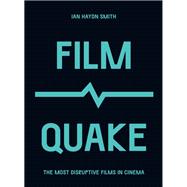FilmQuake introduces 50 movies that shook the cinematic world, telling the fascinating stories behind their creation, reception and legacy.
From unbelievable developments in technology (Citizen Kane, 1941) to feminist triumphs (Wanda, 1970); films that kickstarted New Queer Cinema (Paris is Burning, 1990) to others that challenged lawmakers (A Short Film About Killing, 1988) – FilmQuake presents the movies that questioned boundaries, challenged the status quo and made shockwaves we are still feeling today.
From film's first innovators, people like the Lumière brothers, whose short film of a train arriving was reported to have terrified audiences in 19th century Paris, through iconoclasts like Sergei Eisenstein and Luis Buñuel, to titans of 20th century cinema like Alfred Hitchcock and Jean-Luc Godard, discover the stories behind the films which incontrovertably changed the course of cinema forever.
Into the modern day, this book examines how filmmakers have addressed themes of prejudice and inequality, from the Black Lives Matter movement and Jordan Peele's unmissable Get Out to Bong Joon-ho's cutting study of the lives of the wealthy in Parasite, as well as innovative new cinematic techniques emerging in films like 28 Days Later and Blair Witch Project.
In telling the history of cinema through the works that were truly disruptive, and explaining the context in which each was created, FilmQuake demonstrates the heart of modern film, which is to constantly question boundaries and challenge expectation.
This book is from the Culture Quake series, which looks into iconic moments of culture which truly created paradigm shifts in their respective fields.
Also available is ArtQuake, which tells the stories of 50 pivotal works that challenged consensus and broke daring new ground in the world of art, inspiring shock and scandal as they did so, but ultimately cementing themselves as truly great works of modern art.









